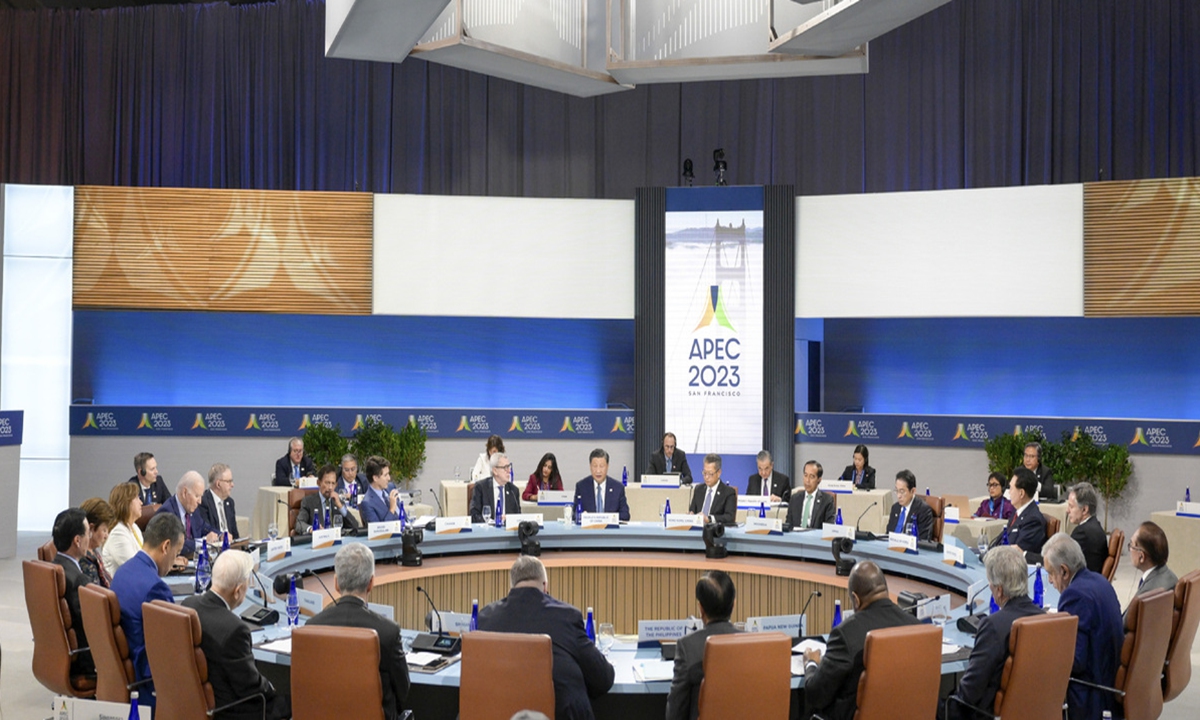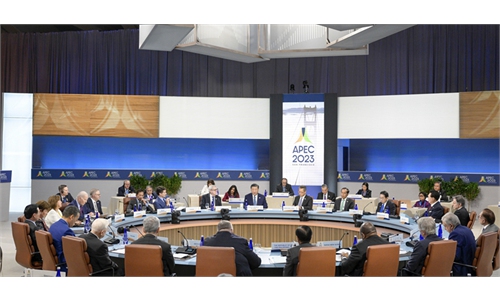
Photo:Xinhua
This year's Asia-Pacific Economic Cooperation (APEC) Economic Leaders' Informal Dialogue, hosted by the US, has received a relatively unanimous positive assessment from APEC economies and the broader international community. This is not easy. Many people were previously concerned that the US might stir up division and advocate its own schedule during the event, thereby polluting and ruining this valuable platform that is committed to economic cooperation in the Asia-Pacific region. This fear is by no means unwarranted. Fortunately, the final result turns out to be good. The outcome of the meeting has increased hopes that the main tone of regional economic cooperation will be maintained and strengthened. In this sense, the APEC summit in San Francisco will have a special place in history and has brought people a lot of inspirations.The San Francisco Declaration, released on November 17 local US time, reaffirms the determination to create a free, open, fair, nondiscriminatory, transparent, inclusive and predictable environment for trade and investment, and also expresses the commitment of all countries to carry out the necessary reforms of WTO in order to improve all its functions. This all reflects a common vision and aspiration for the Asia-Pacific region.
It is quiet noticeable that the San Francisco Declaration does not mention the Russian-Ukrainian conflict as did the Bangkok Declaration issued last year. It was the US that strongly demanded the Russian-Ukrainian conflict be included in the Bangkok Declaration, which caused a great deal of controversy at the time, because most of the members believe that APEC is a mechanism for economic cooperation, not a forum for discussing geopolitical issues. Apparently, this mainstream opinion was even clearer and stronger this year, so that the US, as the host country, did not dare to go against it. In the end, the US issued a separate statement to routinely repeat its stance on the Russian-Ukrainian conflict and the Palestinian-Israeli conflict. This is a case of the failure of Washington's will to kidnap the multilateral mechanism as well as a reflection of the binding and shaping power of the majority consensus on the US.
The US obviously didn't not want to mess up the APEC summit, as it is not only about the sense of shame, but it's also related to US' soft power, national credibility, and "leadership" that the US particularly cares about. Therefore, the US chose to stand with the majority on a number of issues, showing more cooperative gestures, and appearing more restrained, which created the conditions for a fruitful APEC meeting in San Francisco.
But are these changes in US attitudes and styles, and some of the constructive roles the country had played at this edition of the APEC summit, to a certain extent, utilitarian expedients that are unstable and may change at any time? This is a huge uncertainty for not only APEC but also the global governance system. Cooperation is a general trend, but the process will not be smooth, and the key lies in whether the US plays a positive or negative role.
We see that the US played some little tricks as the host of the APEC summit, such as organizing the Indo-Pacific Economic Framework for Prosperity (IPEF) Meetings in San Francisco. With 14 members, the IPEF is a US-created coterie that is widely believed to be targeting China. During the talks, IPEF partners failed to reach a broad trade agreement, thus no progress has been made. It's clear that any multilateral economic and trade mechanism in the Asia-Pacific region that excludes China won't go far.
An important factor that made this APEC meeting go relatively smoothly was the meeting between the Chinese and US heads of state. As IMF Managing Director Kristalina Georgieva said, the Xi-Biden meeting is "a signal to the rest of the world that we must find ways to cooperate." Several international media outlets have talked about how the meeting of Chinese and US leaders eased APEC economies' concerns about the worsening rivalry between the two great powers. The German paper Frankfurter Allgemeine Zeitung said directly that the world is "a little safer" after the Xi-Biden summit. From this, we can feel the common expectations of the international community.
The results must be different whether we choose to go along with these expectations or be contrary to them. For example, the APEC summit in San Francisco, to a certain extent, improved the atmosphere of the international arena and increased the confidence of the regional members in the prospects for cooperation, which is already a considerable achievement. If the US can continue to work with the rest of the international community in the future to build a dynamic, harmonious and prosperous Asia-Pacific community, it will create even greater and more convincing achievements. We hope to see the US take such practical actions. This not only matters world peace and development, but also constitutes a test of the responsibility and integrity of the US.

